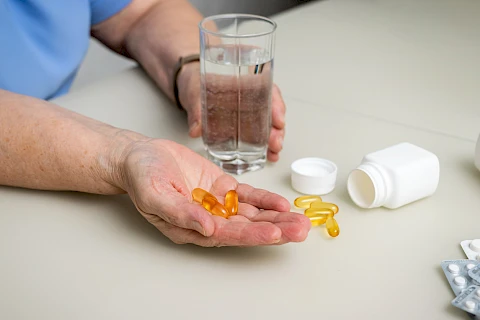
Among the many factors contributing to senior health, vitamin D plays a vital role. It's necessary for bone health, immune system function, and even mental wellness. Unfortunately, many seniors aren't getting the vitamin D they need, impacting their overall well-being.
Let’s take a look at the importance of this nutrient and how much seniors need to stay healthy.
The Importance of Vitamin D
Vitamin D, often termed the "sunshine vitamin," is more than just a nutrient. It functions like a hormone, with every cell in our body housing a receptor for it. It's essential for calcium absorption, which is central to maintaining healthy bones and teeth—a critical consideration as we age. Vitamin D also plays a role in bolstering our immune system and promoting brain and nervous system health.
For seniors, the stakes for vitamin D are even higher. Research implies that vitamin D could help ward off certain types of cancer and heart diseases, both of which are more prevalent in the elderly. It's also associated with improved cognitive function, which may help in preventing degenerative diseases like Alzheimer's.
Recommended Vitamin D Intake for Seniors
The recommended vitamin D dosage for seniors may vary depending on factors such as age, overall health status, and existing medical conditions. Generally, individuals aged 70 and above are advised to intake at least 800 International Units (IU) of vitamin D daily, whereas those younger than 70 may require about 600 IU per day. Always consult with a healthcare provider to determine your senior loved one's specific needs.
The Risks of Vitamin D Deficiency in Seniors
Vitamin D deficiency is unfortunately common among seniors. This shortfall could be due to limited sun exposure, inadequate dietary intake, or the body's reduced capacity to produce vitamin D as we age. A deficiency might initially present subtle symptoms, but in the long run, it can lead to osteoporosis, increase the risk of fractures, and potentially contribute to depression and mood swings.
Ensuring Adequate Vitamin D Levels
Making sure seniors get the right amount of vitamin D involves a balanced approach of safe sun exposure, dietary changes, and possibly supplementation. Sunlight is the most natural source, but it's important to balance time in the sun with skin cancer risks. About 15 minutes of sun exposure to the face and hands per day between 10 a.m. and 3 p.m. could be optimal for most seniors.
Diet-wise, you can incorporate vitamin D-rich foods such as fatty fish (salmon and mackerel), beef liver, cheese, and egg yolks into regular meals. Fortunately, many everyday foods like milk and orange juice are fortified with vitamin D, offering a convenient way to boost intake.
When to Consider Vitamin D Supplementation
For some seniors, especially those with limited sun exposure or specific dietary restrictions, vitamin D supplements may be necessary. They offer a convenient and controlled way to reach the recommended daily intake. Always consult a healthcare provider before starting any supplements. They may wish to run a blood panel to ensure you get just enough to be healthy. Vitamin D supplements are harmful when taken in excess.
Senior Helpers Is Here for You
Vitamin D is an essential part of maintaining wellness during our golden years. By understanding its importance and ensuring our loved ones receive the right intake, we can contribute significantly to their overall health and happiness.
Families with seniors who live in Punta Gorda, South Sarasota, Nokomis, Osprey, or Port Charlotte may benefit from Senior Helpers Venice's extensive in-home services. Our professional caregivers are committed to ensuring your loved one receives the highest quality care and leads a fulfilling, enriched, healthy. Contact us today to learn more about us and what we can do for your family.